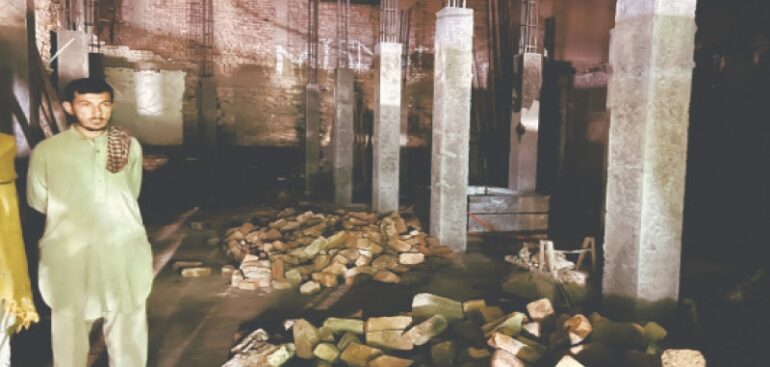In Khyber, the commencement of a commercial infrastructure project has been initiated on the premises of a historic temple within the Landi Kotal Bazaar, after the dismantling of the Hindu sanctuary that had been deserted since the nation’s emancipation in 1947. This development unfolds amidst the district administration’s professed unawareness regarding the temple’s demolition.
Situated at the heart of Landi Kotal bazaar, the temple ceased operations in 1947 following the exodus of the local Hindu communities to India. The edifice suffered partial destruction in 1992 by a group of clerics and seminary students in a reactionary move to the obliteration of the 16th-century Babri Masjid in Ayodhya, India, by Hindu zealots.
Official authorities have detected no legal transgressions in sanctioning the construction of a commercial edifice on the former temple grounds, underscoring the absence of any official documentation identifying a “mandir” (temple) at that location.
Landi Kotal Assistant Commissioner Irshad Mohmand has asserted that the entirety of the Landi Kotal Bazaar is under state ownership, noting an absence of references to the Hindu temple in historical land revenue documentation. He conveyed that the state had granted a no-objection certificate to the developer for the refurbishment and repair of certain aged storefronts located proximal to the temple site.
Further disclosures by his administrative team highlighted the responsibility of the Auqaf Department in the upkeep and conservation of historical religious sites of non-Muslim communities. However, it was noted that this department lacks a physical presence, including an office or personnel, within the Khyber tribal districts.
It was also mentioned that the authority to authorize the erection of commercial structures or storefronts within all commercial and trading hubs of the tribal districts resides with the Tehsil Municipal Authorities.
Shahbaz Khan, the Tehsil Municipal Officer who assumed his role on Friday, elucidated that the local government is mandated to approve the development of any commercial edifices in the region. Such authorization is contingent upon the approval of the proposed architectural plans or drawings and the subsequent payment of the required fees.
He articulated that sanction was conferred solely upon the satisfaction of all prerequisites stipulated by the Tehsil Municipal Authority (TMA), encompassing a site evaluation by an engineer, the compilation of a comprehensive report by the patwari, tehsildar, and the building inspector, followed by an in-depth review to ascertain if the applicant held authentic ownership credentials.
“The absence of accurate and systematically organized revenue records presents a significant impediment to the sanctioning process for the erection of commercial structures,” he acknowledged.
The Tehsil Municipal Officer (TMO) further disclosed that a formal notification had been dispatched to the proprietor of the under-construction plaza. “This notice was acknowledged by certain laborers present at the building site, who, however, declined to unveil the identity of their principal,” he noted.
Abdus Samad, the erstwhile TMO under whose administration the agreement for the commercial building’s construction was initiated, professed total unawareness regarding any directives issued by his office in this context. Nonetheless, he mentioned that it is incumbent upon the TMA’s building inspector and engineer to initially conduct a site visit and subsequently endorse the architectural plan or blueprint of the new structure, predicated on verification of site ownership, as officially sanctioned by the local tehsildar and patwari.
Landi Kotal patwari, Jamal Afridi, expressed his lack of awareness regarding the construction activities on the former temple premises, further noting that the revenue documentation did not reference a temple at that location.
Representatives of religious minority groups voiced their dismay over the demolition of the temple, emphasizing that such actions undermine efforts towards fostering interfaith harmony and tolerance towards non-Muslim communities.
Haroon Sarabdiyal, from the Pakistan Hindu Mandir Management Committee, articulated that preserving and restoring historic religious edifices significant to non-Muslim populations under the purview of the district administration and pertinent governmental agencies. He highlighted the obligation of the archaeology and museums department, police, culture department, and local governmental bodies under the 2016 antiquity legislation to safeguard such sites, including places of worship.
Sarabdiyal warned that the disappearance of worship places and other historic structures affiliated with religious minorities could be imminent if the government fails to meet its responsibilities towards these communities. He proposed that sites no longer in use by minorities or those in a state of disrepair could be repurposed for social welfare activities, thereby serving the broader interests of local communities.
